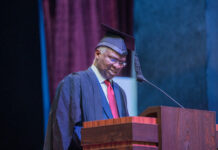 That Rochas Foundation has special schools, where over twenty thousand indigent students from across the country have benefited for almost twenty years, with almost ten thousand currently enjoying free and qualitative education in Oyo, Plateau, Kano and Imo States, is no longer news. It is also not in question that five students from fifty-five African countries are also benefiting from the foundation. What is of apparent significance is the recent appointment of Mrs. Uloma Rochas Nwosu, a graduate of Business Administration from University of Abuja and first daughter of the Imo State governor, a move which caught many unawares/
That Rochas Foundation has special schools, where over twenty thousand indigent students from across the country have benefited for almost twenty years, with almost ten thousand currently enjoying free and qualitative education in Oyo, Plateau, Kano and Imo States, is no longer news. It is also not in question that five students from fifty-five African countries are also benefiting from the foundation. What is of apparent significance is the recent appointment of Mrs. Uloma Rochas Nwosu, a graduate of Business Administration from University of Abuja and first daughter of the Imo State governor, a move which caught many unawares/
In this interview, she bares her mind on new vistas and changes confronting the foundation in the task of helping to remove one million children off the streets of Africa by 2030. Excerpts.
Excerpts.
Tell us a little about yourself?
I am Mrs. Uloma Rochas Nwosu. I am happily married with three wonderful boys. I had my early years in Jos, Plateau State, where I was born. I had my primary education there, and moved to Abuja for my secondary education. Thereafter I went to Dallas Texas in United States for my Associate in Business from college. Then I moved back to Nigeria and went to the University of Abuja where I graduated in Business Administration. This was born out of my passion to be at home. So while I was at the University of Abuja, I started my own business, which metamorphosed into what is today known as The House of FREEDA. I am also the first of six children; three women and three men.
We reliably scooped that one of the things that got you highly recommended for this job, was you passion for charity, how did that come about?
My passion for charity was borne from my early days in Jos. My family on Fridays, once in a month, will go to Masalaci Juma (mosque on Friday), close to our residence, to serve food we had prepared. It wasn’t just serving food we cooked, but we were made to actually prepare those foods ourselves and serve those people on the streets. And watching these people affected me, because I will say I have never known what it is to be hungry. So I couldn’t imagine a world where people could have nothing to eat! So the act of participating in that charity and seeing their faces brighten up, while being fed and thereafter some stipends given, actually helped sow that seed in me. So the passion came from watching my parents all my life helping the less privileged.
But you were not expecting to be named DG of Rochas Foundation, because not long ago you were fully involved in Elfreeda Foundation. What was it really all about?
Before I answer that, I will like to inform here that, not long ago, on my return from the United States, I was involved with Rochas Foundation as one of the sub directors. I initiated the entertainment section to educate while being entertained. I have always known that some day I will end up here because i am a part of Rochas Foundation.
Back to your question on ELFREEDA, that is part of, my passion, which is also a dream part of Rochas Foundation, which is to ensure that every woman and child in need are out of the streets to some safe haven. So I will say, ELFREEDA Foundation is an offshoot of Rochas Foundation. We also have the AB Foundation, which is my brother’s creation. Theirs is taking the school to the streets. If those on our streets can’t come to the school, we take it to them. Everyone in the family has a foundation of his or her own. All these are part of Rochas Foundation.
So why do you think you came in highly recommended for the job as DG?
I don’t think I am the best person to answer that question. But I know I am very passionate about the Rochas Foundation idea. It is something I will always like to do. That’s why I think my father allowed me. I am extremely grateful to the board of directors and my father who gave me the appointment. And it is up to them to answer that question. However, for the most part, I am very passionate and that is what has brought me thus far.
What would you say the Rochas Foundation is all about?
That is a fantastic question. Rochas Foundation is about twenty years old. And Rochas Foundation has solely provided free and qualitative education for every less privileged child. And Rochas Foundation believes that every child has a right to basic and qualitative education, So, our goal is that every child counts and every child should be at school. That is our core focus, but like I said earlier, Rochas Foundation has other communities. We have the Reachout and Touch programmes that takes care of those in need of medical attention; the alms giving we started about three years ago; and ROFOCA (Rochas Foundation College of Africa) that has children from Africa. And like I said earlier, there is the ELFREEDA, SNAP and AB Foundations. These sum up what Rochas Foundation stands for.
With your recent appointment as the Director General of the famous Rochas Foundation, kindly take us through what you are bringing to the table?
So much. I have been DG for almost two months and there’s so much to be done. Rochas Foundation honestly has done well thus far. In twenty years we have fifteen thousand trained, currently have four thousand ROFOSA (Rochas Foundation Old Students Association) members. It has achieved a lot and the milestone is huge. Basically, as the DG what I intend doing is to further bring on more structures, and open up our arms to embrace institutions and individuals as the foundation has gone it alone for twenty years. And I think it is time to get more people involved. That is one of the things my office wants to achieve. Getting more people involved in the activities of the foundation. As a result of that, we will get more African children off the streets.
How would you react to the belief in certain quarters that Rochas Foundation is all about politics?
This again is another fantastic question. I heard this perception eight years ago. And I also heard same about twelve years ago. When I hear this, my reaction is just to laugh it off. And my first thought is, like my dad will always say, ‘If this is politics, then let everybody get involved in this kind of politics’, and the result of that is that we are going to have five to ten million children off the streets. But seriously, you can’t be doing same thing consistently and successfully for twenty years; and it is still termed politics. If it is politics, after getting the office of the governor for two terms, then he would have let go. So, definitely, it is not about politics.
One aspect of the foundation that the public wants to know is how you hope to achieve the one million mark dream in 2030, considering that it is just thirteen years from now. Don’t you see that as rather too ambitious?
A lot of people that know me would attest that these are some of the intricate that formed who I am. I don’t believe that there are dreams too tall. I believe if you can dream it, you can think it and you do it. So the mere fact that you can picture it, if it is an ambition then it is something you can achieve. Like I said, this is one of the core policies that my office will try to achieve, by getting more people involved in the process. Twenty years we have twenty thousand people fed by one man. If it is possible for one man to achieve this, and you now preach that it is no longer about Rochas, and no longer about Uloma the DG, but about everybody, you will see that even when you can’t sponsor a child, you will be able to refer those who can.
We are going to partner with lots of private schools, who are making so much money from privileged children. Out of that they should be able to do some CSR (corporate social responsibility), by picking at least two children from the street. If every of such schools, corporate bodies and highly placed individuals among others could do that, then one million will just be too small to achieve by 2030.
When you got this job as the DG, what was your reaction?
It came with mixed feelings. First, it was excitement; this is our family foundation. It was excitement, a prospect and an opportunity to make a mark with my signature on the desk. On the other hand I was anxious, worried and a little hesitant as the foundation is one of the biggest in Africa. It is a whole lot.
Looking back, would you say that decision was well made?
Again, I see that as off limits as I’m someone who is modest. So I leave that assessment to the president of the foundation, the vice president and board members. However, I have two things going for me. For my dad to give me this job, I guess it was borne out of trust, and God almighty who is the omnipotent, who ensures that I am on the right path.
It is just two months since you took this office, is there a moment you looked back and say, it was good decision made?
Yes. Recently, we hosted the President of Liberia, and she visited ROFOCA, and my sister, Miss Uchechi Rochas, Director of the school, once we got there, I saw the excitement on the faces of the children, especially when the Liberian children had the opportunity to hug their president. It got me emotional, and made me grateful for the opportunity to serve in this capacity, because these are children who lost their parents to Ebola and were roaming the streets. They never dreamt of an opportunity to shake a minister let alone a president. So the glow and excitement, you can’t measure that. In that moment I was excited to be part of the foundation.
From your submission so far, your family is synonymous with charity, would you say you are grateful with this kind of work?
WE are all involved in charity. We owe it to our upbringing. My father will always say, ‘there is nothing to life if you are not able to affect the lives of your neighbor positively’. One early morning, so many years ago in Jos, he called for a meeting, which has been our tradition, anyway. And he said, ‘All these things you see, so many big cars and houses will be one day worth a bicycle. If you want to keep living this life, you have to know that these things don’t matter. A life of substance is what you are able to do for your next door neighbor.’ He also lets us know that what makes you rich is not about the cash in your pocket, but it really is about how many people you have been able to touch. He also made a joke that has remained indelible, by asking us, ‘imagine how rich your father is? Having trained two thousand children in school? Which man is richer than your father?’ We grew up with that mentality, than to begin to attach value to such material thing. That is the spirit that my younger ones and I grew up with. which has stuck with us till date.
Your job entails so much officialdom, how do you get to relax?
First and foremost, my best friend is my husband. We are both busy people, but we find time. When we get home we watch movies. On Sundays we go for visitations. I also dance very well. Once I am not in the office I go dancing with my family at home.
With a set of twins and another boy that means you have four men on you, how do you cope?
It’s a lot. That is why I pray so hard for a girl who will help to calm down the hyper situation. They are amazing and I look forward towards going home to be with them. Because they will just jump on






